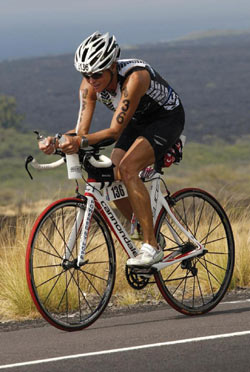Advanced Colon Cancer Survivor
Survivor never stopped chasing her dream
 When colon cancer survivor Teri Griege isn’t running marathons or competing in triathlons, the former nurse is spreading the word about colorectal cancer and inspiring people to overcome adversity through her work as a motivational speaker. Teri and her husband, Dave, are married and have two children in their 20s. Learn more about Teri’s experience with colorectal cancer on her website, www.terigriege.com, or on her Facebook page, Teri Griege – Powered by Hope.
When colon cancer survivor Teri Griege isn’t running marathons or competing in triathlons, the former nurse is spreading the word about colorectal cancer and inspiring people to overcome adversity through her work as a motivational speaker. Teri and her husband, Dave, are married and have two children in their 20s. Learn more about Teri’s experience with colorectal cancer on her website, www.terigriege.com, or on her Facebook page, Teri Griege – Powered by Hope.
Everyone has dreams about what they want to be when they grow up. My dream was to one day compete in the IRONMAN World Championship in Kona, Hawaii. After running in the Chicago, Boston and New York marathons, I became interested in triathlons. In 2008, I finished IRONMAN Louisville just five minutes shy of qualifying for my dream: the World Championship. The following year, I again competed in Louisville, but this time I finished 10 minutes slower. I had been noticing a little blood in my stool and was becoming increasingly quick to fatigue, but it wasn’t until I finished that race with a worse time than the year before that I knew something was seriously wrong.
I went to see my doctor two weeks later, and he ordered a colonoscopy and a CT scan. A few days later, on Sept. 17, 2009, at the age of 48, I was diagnosed with Stage IV colon cancer, and it had already spread to my liver. I was shocked by the news, but I quickly found a team of wonderful health care professionals, including a colorectal surgeon, a liver surgeon, a medical oncologist and a radiation oncologist. Within five days of my diagnosis, all four doctors had spoken to each other multiple times and had created my treatment plan.
I first had a short course of radiation to shrink the tumor, followed by five rounds of FOLFOX chemotherapy and a surgery that consisted of both a colon and liver resection. I then had seven more rounds of FOLFOX before starting a maintenance chemotherapy regimen that I will continue for the rest of my life: one week on, one week off of bevacizumab (Avastin) and capecitabine (Xeloda).
Despite the side effects (some of which I continue to experience), including neuropathy, sensitivity to cold, a weakened im-mune system, weight loss, low energy, mouth sores, bruising and an occasional bloody nose, I never stopped training. From the day I was diagnosed (aside from a short break after surgery), I continued to swim, bike and run on a daily basis. I used my training as an outlet and a way to believe that I would be OK. Along the way I set both small and large goals, from 5Ks to IRONMAN events. And against all odds, on Oct. 8, 2011, at the age of 50, I crossed the finish line of the IRONMAN World Championship in Kona. Even with Stage IV colon cancer, I had found a way to make my dream come true.
Of all the cancers, “butt cancer” may be the most uncomfortable to talk about, but I have now made it my mission. Normal screening doesn’t begin until age 50, but I was 48 when I was diagnosed; so I believe that in sharing my story, lives can be saved. My sisters, for example, who were 61 and 62 at the time, had never had a colonoscopy. Two weeks after I was diagnosed, they both made appointments. Sure enough, one had precancerous polyps and the other had Stage III colon cancer. We now work together to spread awareness about this disease whenever and wherever possible.
Colorectal cancer gave me an opportunity to reframe my life, and it taught me a lot about myself. I’m now making each day count, and although I’m not as physically strong as I used to be, I plan to participate in running and triathlon events as long as I can. In addition to my maintenance chemotherapy, I have scans every three to six months, and my health care team is currently monitoring some spots on my lungs. However, no matter what comes my way, I will maintain an attitude of gratitude. Powered by hope, anything is possible.


